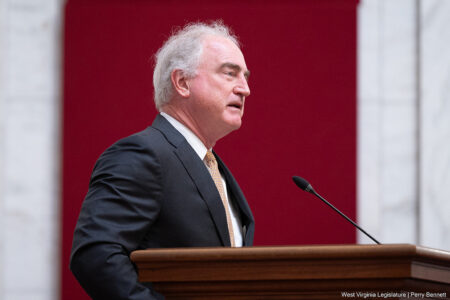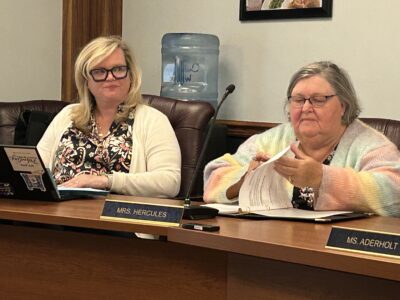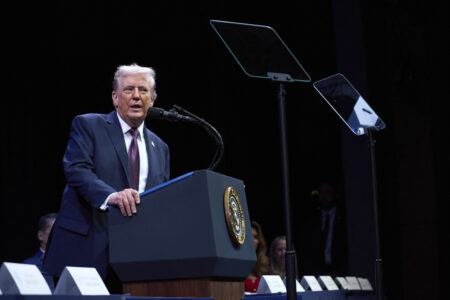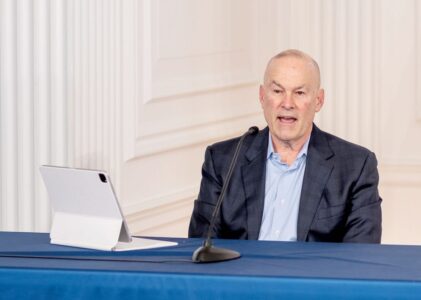West Virginia Revenue Officials Begin Working on 2027 Budget

photo by: W.Va. Legislative Photography
Department of Revenue Secretary Eric Nelson briefed lawmakers Monday on preparations on the next general revenue budget that will be presented to the Legislature next year.
CHARLESTON — West Virginia is more than two months into fiscal year 2026, but work has already begun on the draft general revenue budget for 2027 that lawmakers will consider in January.
Officials with the state Department of Revenue on Monday briefed members of the Joint Standing Committee on Finance on the second day of the three-day legislative interim meetings at the State Capitol Building.
Department of Revenue Cabinet Secretary Eric Nelson told committee members that work on the fiscal year 2027 budget is already underway, based in part on the re-implementation of six-year general revenue budget plans under Gov. Patrick Morrisey.
“When I sat in your all’s seats, we didn’t see that the last four or five years,” Nelson said. “So, we’re always looking ahead.”
Nelson said the state departments and agencies are being asked for requests for the fiscal year 2027 general revenue budget that lawmakers will approve during the regular 60-day session that starts in January to go into effect on July 1, 2026. State departments and agencies are also being asked to submit requests for future supplemental appropriations and five-year plans.
“Not only were the agencies asked to give us their ’27 requests as is standard, they were asked for ’27 supplementals,” Nelson said. “These are the one-time spends that they have immediate needs for that have not been funded in the past or special things that have come forward. Also, this year, each agency is being asked for a five-year plan. Let’s look out five years, and what do we see? What do we anticipate?”
State revenue officials are trying to be proactive with budgeting in case the state is affected by changes in future federal funding due to the One Big Beautiful Bill Act that went into effect a few months ago.
“As changes happen in D.C., we have these changes all the time. So we’ve got to be flexible, and that’s part of our budgeting process right now,” Nelson said.
During fiscal year 2025, federal funding made up half of the overall state budget (general revenue, special revenue, State Road Fund, and lottery) at $9.63 billion. Any reductions over the next year or several years in federal funding could place additional burdens on the general revenue budget.
Sen. Ben Queen, R-Harrison, asked Nelson about the state of West Virginia’s finances going into the next fiscal year. When Morrisey first took office in January, revenue officials projected a nearly $400 million gap in fiscal year 2026 spending versus revenues in an early six-year budget forecast. The “hole” was attributed to the influx of federal funding due to COVID-19 and other monies, combined with overreliance on one-time funding.
The Legislature passed — and Morrisey signed — a $5.323 billion general revenue budget for fiscal year 2026, which began on July 1 and continues through the end of June 2026. The state ended fiscal year 2025 on June 30 with $5.519 billion in collections for the general revenue fund and $254.8 million in surplus tax revenue. In a separate press release Friday, Morrisey said the total end-of-fiscal year surplus, once all the books were closed out, was closer to $338 million.
“Every time I come into this building, I’m confused whether we’re in a healthy place or not,” Queen said. “Nine months ago, I felt like we were going to go through some pretty tough budget cuts, but today I feel like we’re in a pretty good, healthy position.”
Much of the $338 million surplus was already spent by the beginning of the fiscal year due to supplemental appropriations using available surplus dollars during the 2025 legislative session. Another $100 million went to the Division of Highways for road maintenance and paving projects as required in the surplus section in the back for the fiscal year 2026 budget, which appropriates surplus dollars available at the end of the previous fiscal year.
According to the State Budget Office, the state has more than $161 million in unappropriated money in the general revenue fund to date. Combined with $1.374 billion in the state’s Rainy Day Fund and $460 million set aside in the personal income tax reserve fund, the state has more than $1.9 billion in reserves.
Combined tax collections for July and August — the first two months of the current fiscal year — were $785.1 million, or 2.25% above estimates and 6.22% above $739.1 million during the first two months of fiscal year 2025. The state is ahead of collections by $17.3 million. Nelson credited the fiscal condition of the state to good timing of certain tax collections.
Nelson said September tax collection numbers will be key, including consumer sales and use tax revenue; severance tax for oil, coal and natural gas; and corporate net income tax.
“So much of this… is timing, especially as it relates to the severance,” he said. “September is a big month for all of us. Many individuals will pay quarterly estimates, and that’s when most of our corporate income taxes come in, too. So, we’ll have a better idea at the end of September.”





